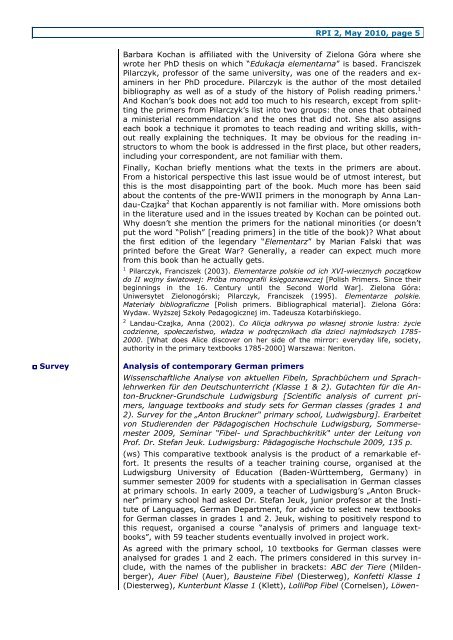- Reading Primers International No 2 S I G Newsletter 05 10
- Reading Primers International No 2 S I G Newsletter 05 10
- Reading Primers International No 2 S I G Newsletter 05 10
Create successful ePaper yourself
Turn your PDF publications into a flip-book with our unique Google optimized e-Paper software.
RPI 2, May 20<strong>10</strong>, page 5<br />
Barbara Kochan is affiliated with the University of Zielona Góra where she<br />
wrote her PhD thesis on which “Edukacja elementarna” is based. Franciszek<br />
Pilarczyk, professor of the same university, was one of the readers and examiners<br />
in her PhD procedure. Pilarczyk is the author of the most detailed<br />
bibliography as well as of a study of the history of Polish reading primers. 1<br />
And Kochan‟s book does not add too much to his research, except from splitting<br />
the primers from Pilarczyk‟s list into two groups: the ones that obtained<br />
a ministerial recommendation and the ones that did not. She also assigns<br />
each book a technique it promotes to teach reading and writing skills, without<br />
really explaining the techniques. It may be obvious for the reading instructors<br />
to whom the book is addressed in the first place, but other readers,<br />
including your correspondent, are not familiar with them.<br />
Finally, Kochan briefly mentions what the texts in the primers are about.<br />
From a historical perspective this last issue would be of utmost interest, but<br />
this is the most disappointing part of the book. Much more has been said<br />
about the contents of the pre-WWII primers in the monograph by Anna Landau-Czajka<br />
2 that Kochan apparently is not familiar with. More omissions both<br />
in the literature used and in the issues treated by Kochan can be pointed out.<br />
Why doesn‟t she mention the primers for the national minorities (or doesn‟t<br />
put the word “Polish” [reading primers] in the title of the book)? What about<br />
the first edition of the legendary “Elementarz” by Marian Falski that was<br />
printed before the Great War? Generally, a reader can expect much more<br />
from this book than he actually gets.<br />
1 Pilarczyk, Franciszek (2003). Elementarze polskie od ich XVI-wiecznych początkow<br />
do II wojny światowej: Próba monografii księgoznawczej [Polish <strong>Primers</strong>. Since their<br />
beginnings in the 16. Century until the Second World War]. Zielona Góra:<br />
Uniwersytet Zielonogórski; Pilarczyk, Franciszek (1995). Elementarze polskie.<br />
Materiały bibliograficzne [Polish primers. Bibliographical material]. Zielona Góra:<br />
Wydaw. Wyższej Szkoły Pedagogicznej im. Tadeusza Kotarbińskiego.<br />
2 Landau-Czajka, Anna (2002). Co Alicja odkrywa po własnej stronie lustra: życie<br />
codzienne, społeczeństwo, władza w podręcznikach dla dzieci najmłodszych 1785-<br />
2000. [What does Alice discover on her side of the mirror: everyday life, society,<br />
authority in the primary textbooks 1785-2000] Warszawa: Neriton.<br />
Survey Analysis of contemporary German primers<br />
Wissenschaftliche Analyse von aktuellen Fibeln, Sprachbüchern und Sprachlehrwerken<br />
für den Deutschunterricht (Klasse 1 & 2). Gutachten für die Anton-Bruckner-Grundschule<br />
Ludwigsburg [Scientific analysis of current primers,<br />
language textbooks and study sets for German classes (grades 1 and<br />
2). Survey for the „Anton Bruckner“ primary school, Ludwigsburg]. Erarbeitet<br />
von Studierenden der Pädagogischen Hochschule Ludwigsburg, Sommersemester<br />
2009, Seminar “Fibel- und Sprachbuchkritik“ unter der Leitung von<br />
Prof. Dr. Stefan Jeuk. Ludwigsburg: Pädagogische Hochschule 2009, 135 p.<br />
(ws) This comparative textbook analysis is the product of a remarkable effort.<br />
It presents the results of a teacher training course, organised at the<br />
Ludwigsburg University of Education (Baden-Württemberg, Germany) in<br />
summer semester 2009 for students with a specialisation in German classes<br />
at primary schools. In early 2009, a teacher of Ludwigsburg‟s „Anton Bruckner“<br />
primary school had asked Dr. Stefan Jeuk, junior professor at the Institute<br />
of Languages, German Department, for advice to select new textbooks<br />
for German classes in grades 1 and 2. Jeuk, wishing to positively respond to<br />
this request, organised a course “analysis of primers and language textbooks”,<br />
with 59 teacher students eventually involved in project work.<br />
As agreed with the primary school, <strong>10</strong> textbooks for German classes were<br />
analysed for grades 1 and 2 each. The primers considered in this survey include,<br />
with the names of the publisher in brackets: ABC der Tiere (Mildenberger),<br />
Auer Fibel (Auer), Bausteine Fibel (Diesterweg), Konfetti Klasse 1<br />
(Diesterweg), Kunterbunt Klasse 1 (Klett), LolliPop Fibel (Cornelsen), Löwen-


